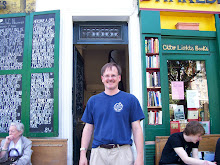Wednesday, February 14, 2007
Clichés and lugares comunes
Did you ever have an English prof who told you not to use so many clichés? Well, we all have had that professor. I have even been that professor! But another word for someone who knows a lot of clichés is somebody who is linguisticially competent. Think about it for a minute. If you knew all the clichés in Spanish, you would know quite a bit of Spanish.
Lugares comunes or commonplaces, are to be avoided, in excess, but isn't it worse not to have known them in the first place?
Think of the phrase "woefully inadequate." We know somehow that this adverb goes with the adjective inadequate. I find 837,000 hits on google for this phrase. So your English teacher is right to mark it as a cliché, right? Yet when you say this phrase it sounds rightl; it is idiomatic English.
Think of other adverb/adjective combinations that are statistically probable...
Now think of how to say, in Spanish, "to get to sleep." It is "conciliar el sueño." That is an idiom, but also, in some sense a cliché, a formula. As writers of English, your goal might be to avoid falling into excessively formulaic language. But in Spanish, a second language for you, part of what your goal should be is to know these formulaic phrases.
Proverbs, or refranes, are, in some sense, the canonical *clichés* in a language.
Did you ever have an English prof who told you not to use so many clichés? Well, we all have had that professor. I have even been that professor! But another word for someone who knows a lot of clichés is somebody who is linguisticially competent. Think about it for a minute. If you knew all the clichés in Spanish, you would know quite a bit of Spanish.
Lugares comunes or commonplaces, are to be avoided, in excess, but isn't it worse not to have known them in the first place?
Think of the phrase "woefully inadequate." We know somehow that this adverb goes with the adjective inadequate. I find 837,000 hits on google for this phrase. So your English teacher is right to mark it as a cliché, right? Yet when you say this phrase it sounds rightl; it is idiomatic English.
Think of other adverb/adjective combinations that are statistically probable...
Now think of how to say, in Spanish, "to get to sleep." It is "conciliar el sueño." That is an idiom, but also, in some sense a cliché, a formula. As writers of English, your goal might be to avoid falling into excessively formulaic language. But in Spanish, a second language for you, part of what your goal should be is to know these formulaic phrases.
Proverbs, or refranes, are, in some sense, the canonical *clichés* in a language.
